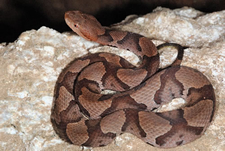Some Frequently Asked Questions

Cottonmouth/water moccasin in a defensive posture
Do cottonmouths live in the upstate?
They are not known to occur in the upstate. Cottonmouths are venomous and highly aquatic snakes that are sometimes called “water moccasins.” They are closely related to copperheads. In South Carolina, cottonmouths typically live in the sandhills and coastal plain regions, but do not enter the piedmont nor mountain regions of the state. They would typically be found below an imaginary line reaching from upper Chesterfield county through upper Richland County, across Edgefield and McCormick Counties. They inhabit swamps, streams, floodplains, and other wetland habitats. There are records of this species in McCormick and Edgefield Counties, above the Fall-Line, but these occur in the Savannah River Valley, on Coastal Plain terraces that “follow” the river across the Fall-Line.
Do snakes ever attack or chase people?
The basic answer is no – most snakes either lay perfectly still – or flee when approached by a person. But the word “ever” covers a lot of territory and the fact is that on rare occasions in mid springtime some people, including herpetologists, have reported being advanced upon by adult black racers. In some cases this is simply the snake trying to get to its “home hiding place” and the person was in the way. In these cases the advancing snake simply goes right past the person onward to its destination. But there have also been cases of black racers approaching and striking at people who did not provoke them. However, by far the most common response from black racers is to speedily “race away” from any person. Black racers are non-venomous and any bite by them would be like a scratch from a bramble.
How often do snakes shed their skin?
The outer layer of a snake’s skin does not grow. So, as the snake grows, it periodically sheds this outer layer. The frequency of shedding relates to the rate of growth. Young snakes grow faster than adults, and thus shed more frequently. On average, a healthy adult snake will shed it skin 2-4 times a year.
 How can I keep snakes from coming into my yard (or, how can I get rid of the ones that
I see there)?
How can I keep snakes from coming into my yard (or, how can I get rid of the ones that
I see there)?
There is no known method to eliminate snakes from your property. Because of the possible habitats provided on your property, and because of the habitats on adjacent lands, there is always the chance that you will have some snakes on your property. However some things that you can do are beware that they will be attracted to wood piles, remote out buildings, fallen logs, mulch piles, and other natural ground cover items. Remove or relocate these items accordingly.
What should you do if bitten by a venomous snake?
The best advice is to try to remain calm, and get to a hospital as soon as possible. Call 911 if that is appropriate, and if possible take a cell phone photo of the snake (from a safe distance) to show to the physician.
Do non-venomous snakes bite?
Yes, some do. Many individuals of our larger non-venomous snakes (rat snakes, racers, water snakes, garter snakes, etc.) may bite when first handled (some with great enthusiasm), others not. And, if it’s a big snake it can cause some bleeding as from a scratch by a briar. Though it’s not a serious wound, you will feel it. Most of the smaller species (worm snakes, ringneck snakes, green snakes, brown snakes, etc) do not bite.
Where can I go to see exhibits of some live upstate snakes, including the venomous species?
Seeing live specimens is one of the best ways to learn to identify snakes. Two public locations to see examples of our upstate snake species are:
- The Greenville Zoo (phone – 864-467-4300, on the Web at https://greenvillezoo.com/), and
- The Riverbanks Zoo and Garden in Columbia (phone 803-779-8717, on the Web at https://www.riverbanks.org/)
I have a child who is interested in learning about snakes, lizards, frogs, and related wildlife. What can I do to help with their interest?
- Obtain copies of some of the books mentioned in the "General Information" section of this Web site. Local libraries will have copies of some of these books, and related books, for you to borrow. Also, most libraries have computers available for public use. You can use them to look up the mentioned Web sites.
- Visit the zoos mentioned in the above response.
- Watch the S.C. State Parks Web site at https://southcarolinaparks.com/. Check the “events and
programs” item. You will likely find several convenient opportunities over the course of a year to
participate in a ranger led program or field trip relating to snakes and other reptiles.
- Many people interested in snakes or other reptiles and amphibians eventually want to keep one or more as a “pet.” There are many books that provide information on this subject. But, never try to handle, capture, or keep a venomous snake.
